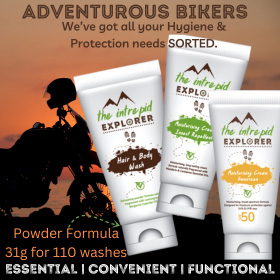 134Likes 134Likes
 |
|

5 Jan 2014
|
 |
Registered Users
Veteran HUBBer
|
|
Join Date: Nov 2010
Location: Santa Cruz, California
Posts: 316
|
|
|
Myth of the Lonely Wanderer

When people ask me the standard round of questions of where I’ve been and where I’m going and whether I’m alone, I always have a hard time saying yes to the last question.  There was no one I could convince back home to do this trip, so it is true that I set off alone. While the vision of a solitary man roaming the coastlines of the world with only his trusty surfboard at his side is a romantic one, I’ve never found it to have much basis in reality. Of course there are lonely stretches from time to time, but generally, I don’t seem to spend all that much time alone. Whether it’s meeting other travelers or getting to know the people of the places I visit, company is usually never far away. My recent stay in Western Sahara is a great example of friends that seem to always materialize on the road, where a gang of us spent weeks living at a campground.
Two of the most adventurous souls that I’ve run into lately are Kuba and Lindsey. Kuba is a widsurfer from Poland and Lindsey is a yoga teacher from the U.S. They both have spent time other places in Africa, working as they’ve gone. They don’t seem to have an end to the globe trotting in sight as they dream of crossing the Atlantic on a sailboat.
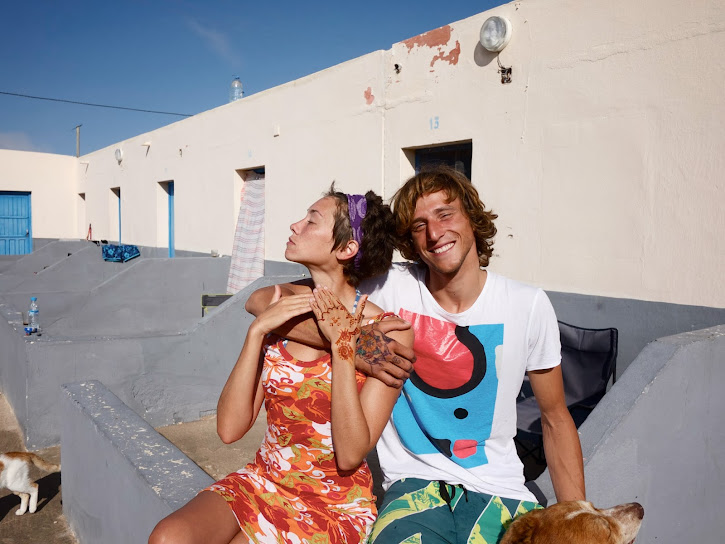
Bob is the traveling veteran of the crew. For years, he’s ridden is BMW GS1200 from his home of England down the West Coast of Africa as far as The Gambia. He knows more about American politics than I do and holds me to account for most of US foreign activities and entertainment exports. It was only through the daily exchange of croissant, coffee, witty insults and motorcycling stories that we managed a truce. He’s also the most deadly man in camp with a fly swatter.
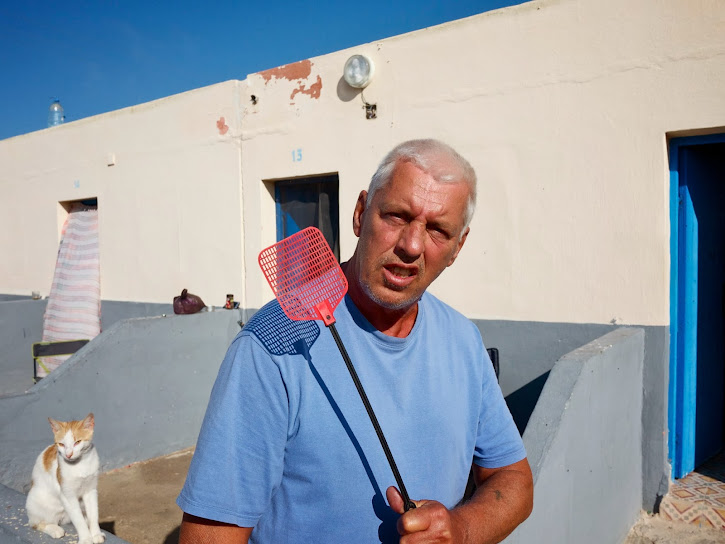
Karen’s father is from Morocco and she has come here to embrace her roots by learning the local tribal language of Berber and first and foremost learning to kitesurf.
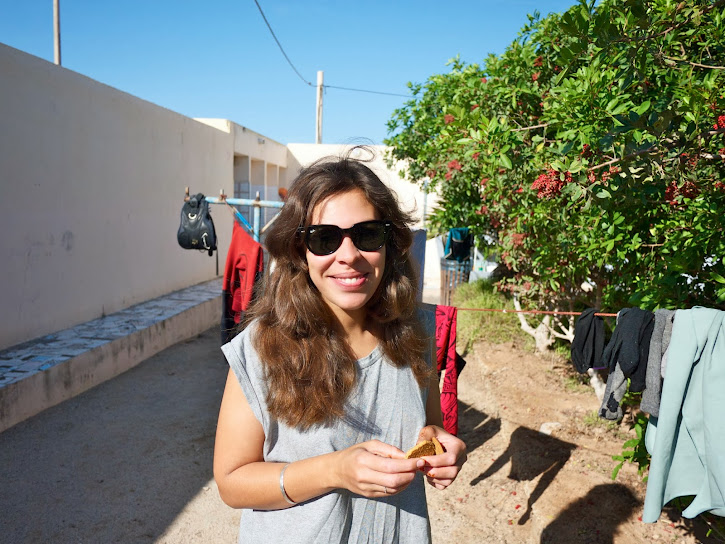
When the surf went flat, I got a windsurfing lesson from Kuba.

When the surf kicked up, we all went surfing. Dyna Rae earned her keep -three surfers, three surfboards, one moto!
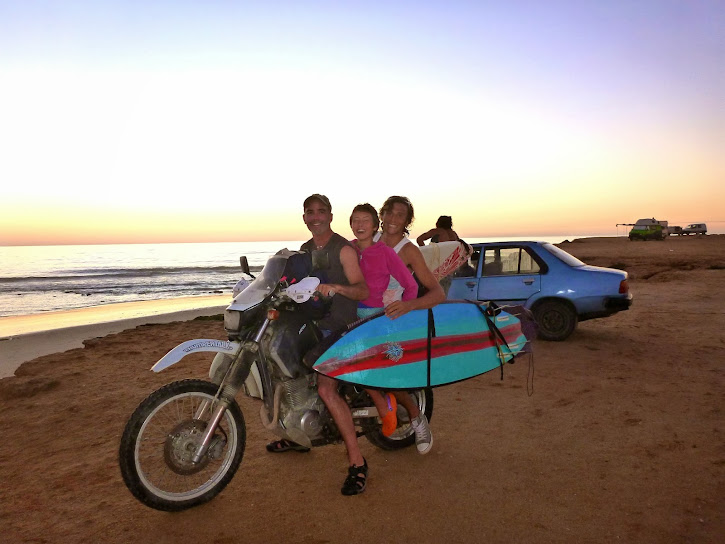
On the road, overland travelers going the same direction find each other again and again or hear about each other’s progress and pitfalls through the grapevine and provide advice on routes and border crossings. It becomes a support network of sorts. I got invited to Christmas dinner in Dakar by another rider who happened to have seen my blog. Esteban from Spain on the KTM Adventure is having starter trouble in Nouakchott but found a great former Dakar Rally mechanic to help. Jonathan from England got stuck in the desert repairing a puncture. The English couple on a tandem bicycle were run off the road by a truck and wrecked their rear wheel. No one seems to know where the Aussies, Luke and Ben, riding two up on the Royal Enfield have gotten to. The two German guys in a Toyota 4-Runner that helped push me out of the Senegal River are headed to The Gambia to a fellow German who was camped with us in Dakhla get out of an unfortunate landing in jail. It goes on and on like this..
I think that the point is this: if you have even the slightest notion to set off on some journey of your own design, but no one to share the adventure with, there is no need to hesitate. Wherever you might wander, your friends are already there waiting for you. Hopefully they're not in jail when you get there.
|

6 Jan 2014
|
 |
R.I.P.
Veteran HUBBer
|
|
Join Date: Aug 2003
Location: california
Posts: 3,821
|
|
Quote:
Originally Posted by garnaro

Coping with deep sand, but it ain't pretty..
The Mefo explorer front feels absolutely terrible on anything by tarmac - going to try to change to a TKC 80 in Togo or Ghana. Should have left with one mounted, really.
Your posts from years gone by actually helped me select and kit out the DR for the trip mollydog..
Bike is doing very well so far approaching 24K - that's 7K miles on this trip and 5K just before shipping it to London on the Oregon BCDR and Northern Continental Devide route + transit back to CA.
It's holding up better than the gear, really which seems to keep breaking. Who knew that JB weld was good for fixing moto boots? Even managed to break my pelican case! No problems with the bike other than an occasional annoying knock on a hot restart that I've read about from other owners and would love to diagnose properly. I'm due for oil change and valve check pretty quick now.
|
Plus one: Mefo NOT GOOD in sand. Remember, any good 21" 90/90 front knobby will be an improvement on the Mefo ... better in sand and off road in general. Does not have to be the expensive TKC. Just use caution with the knobby once back on tarmac and on wet roads. (noisy too)
Glad you were able to benefit from my thread. Lots has changed since then but my DR is still running strong, better than ever  ... now at 55,000 miles. Most of that old thread shows all the mistakes I made. I've learned lots since and figured out a few things for "on the road". I should go back the correct all the mis-information and incorrect assumptions. Someday.
Good on ya for improvising vis a vis JB Weld for boot repairs! 
I used epoxy to fix my old dirt bike boots too ... the sole came off!
I've broken two Pelicans ... I should say... baggage handlers broke them. Pelican provided new ones free, no questions asked. I use Pelicans for Digital Audio equip. travel on jobs worldwide. Used them since the 1980's ... but never on a bike.
Is the knock from the starter motor or the motor itself? Not sure what this could be. I'll think about it ... 
Is battery low? Does it happen starting in gear and in neutral? (I try to start in neutral when possible) Mystery to me, hope others have ideas.
Low octane fuel ... or water or Diesel in fuel, can cause knocking ... even at start up, especially hot. Look at spark plugs ... any crud build up on them? If so, then dreaded pre-ignition may be the cause?? :confused1:
looking forward to more up dates and great photos!

|

12 Jan 2014
|
|
Registered Users
New on the HUBB
|
|
Join Date: Dec 2013
Location: Brisbane, Australia
Posts: 6
|
|
Sounds like you'll have an amazing trip. Looking forward to reading your updates as they come along. Safe travels!! 
|

15 Jan 2014
|
 |
Registered Users
Veteran HUBBer
|
|
Join Date: Nov 2010
Location: Santa Cruz, California
Posts: 316
|
|
Quote:
Originally Posted by mollydog

Plus one: Mefo NOT GOOD in sand. Remember, any good 21" 90/90 front knobby will be an improvement on the Mefo ... better in sand and off road in general. Does not have to be the expensive TKC. Just use caution with the knobby once back on tarmac and on wet roads. (noisy too)
Glad you were able to benefit from my thread. Lots has changed since then but my DR is still running strong, better than ever  ... now at 55,000 miles. Most of that old thread shows all the mistakes I made. I've learned lots since and figured out a few things for "on the road". I should go back the correct all the mis-information and incorrect assumptions. Someday.
Good on ya for improvising vis a vis JB Weld for boot repairs! 
I used epoxy to fix my old dirt bike boots too ... the sole came off!
I've broken two Pelicans ... I should say... baggage handlers broke them. Pelican provided new ones free, no questions asked. I use Pelicans for Digital Audio equip. travel on jobs worldwide. Used them since the 1980's ... but never on a bike.
Is the knock from the starter motor or the motor itself? Not sure what this could be. I'll think about it ... 
Is battery low? Does it happen starting in gear and in neutral? (I try to start in neutral when possible) Mystery to me, hope others have ideas.
Low octane fuel ... or water or Diesel in fuel, can cause knocking ... even at start up, especially hot. Look at spark plugs ... any crud build up on them? If so, then dreaded pre-ignition may be the cause?? :confused1:
looking forward to more up dates and great photos!
 |
Thanks for suggestions..I think that the noise is from the starter motor..moto TLC is on the way soon - I'll report back..
|

15 Jan 2014
|
 |
Registered Users
Veteran HUBBer
|
|
Join Date: Nov 2010
Location: Santa Cruz, California
Posts: 316
|
|
|
Escape from Dakar

It’s a strange feeling when a foreign capital like Dakar begins to offer the comfort of familiarity.  I’ve run up and down the Cape Vert peninsula so many times looking for various embassies that I no longer need my GPS anymore to navigate. After two and a half weeks here, I have my regular coffee shop, market, bakery and I know the gas station with the cheapest  s. The fisherman who watches my bike while I surf brings me a fish to eat hot off the grill as soon as I’m out of the water. The girls at the coffee shop laugh at my pronunciation of French words that they try to teach me. I know where to turn off to avoid traffic jams and when I can ride up on the sidewalk to pass cars without encountering a massive drop-off or hole. I’ve developed jedi-like powers for anticipating particularly dangerous moves from a taxi driver. Every day I ride less than 2 miles and every day I see at least two traffic accidents. Today I saw three. If I happen to forget my sunglasses I constantly have little bits of diesel debris flying into my eyes. The little tree-lined corner of a parking lot where my tent sits feels like my little sanctuary from the chaos of the city, even if the tent floor was copiously littered with the corpses of giant ants that I do battle with nightly. I’ve ridden lots waves and I have the visas I need, so its time to wedge myself out of this comfortable corner of the city. I got the bike ready and did some surgery on turn signals that had fallen victim to the Sahara dust.

Before I was to leave Dakar, there was another swell on there was another swell to ride. While about the same size as the one that rolled in when I’d arrived, this one had a bit more northerly direction to it, making the right-hand breaking part of the reef the better wave to ride. For two days I surfed through the low tide and finally found the exits from some proper tubes. Getting yourself into and out of small tubes is much easier on your forehand (right breaking waves for me since I surf regular foot) than on your backhand. The first day I surfed with a crowd of locals and a few French grommet rippers, but the second day I had two 3 hour sessions all to myself. At dead low tide, I watched dry rocks exhumed just shoreward of where the lip of the wave landed as I slotted in for a little barrel and I could just about feel my fins dragging on the urchin laden reef below me. In waves like this, the safest alternative is always to stay where the most water is, which is on the wave. The worst thing to do is not to make the wave and have to straighten out or get pitched over with the lip. That lands you right where the least water is. I made a few errors that a in more powerful surf would have had me doing a very ugly and painful reef dance, but on these days was give a pass and always seemed to be allowed to squeak off the reef and back to the channel.

I left Dakar much heavier than I arrived. Jonah, the young German traveler who had helped push me out of the mud on the way to Dakar had briefly returned to home to Europe and needed a lift down to Banjul in The Gambia after returning to Dakar. In addition to the strapping lad I added to the bike, I also added at least 6o pounds of wonderful German cheese, salami, and sausage that Jonah had packed in to sustain himself and his uncle Chris in style as they motored southward in their Toyota. The bike seemed to give up most of the rear travel as soon as Jonah sat down with his backpack. This was going to be an interesting trip.

Dyna Rae turned from a lithe gazelle into a drunken pig. Everything happened in slow motion now – acceleration, braking, and steering all turned to oatmeal. Every hit the bike took from a rock or pothole was exaggerated and felt like an undeserved beating was being served on my poor beloved machine. It put me a in a bit of a bad mood. We weaved back and forth across the tarmac finding the lines through the minefield of square edged craters. Eventually the tarmac had deteriorated to the point that I thought we’d be better off in the dirt, where at least the edges of holes are less square. As if to call my bluff, the tarmac went away and there were were were, two up and loaded in the dirt.
I like riding my bike in the dirt. But this was not my bike. This was some uncoordinated, gelatinous grontor donut-devouring version of my bike. To add to the fun, my rear brake had packed up, so I only had the front to use. It wasn’t fast or pretty, but we made into The Gambia and to the ferry port to cross the river to across the river to the capital city of Banjul. We were the last passengers squeezed onto the last ferry of the day, with my rear wheel nearly hanging off the rear of the slowest ferry boat in Africa.

We arrived in The Gambia to find that our young German friend who I’d first met in Dakhla was finally out of jail after a few weeks of less than ideal accommodation and Jonah's uncle, Chris, camped out at a compound on the beach south of Banjul. Chris had spent weeks trying to help him straighten out the inevitable mess that happens when you cross an international border in a vehicle where lots of joint rolling had happened and very little cleaning had happened. With plenty of stony dipshit detritus laying about the car, getting out of jail had become rather time consuming and expensive.

The surf was windblown and abysmal looking, so Chris and I laid around on the beach on the beach like indulgent tourists while Jonah rigged up the kite to show us how it was done.

We camped with some folks Chris had befriended named Freeman and Osman who were starting to build a beach bungalow and restaurant. For now it was just a clearing of the jungle on the beach, but it suited us just fine and I pitched my tent right on the sand.

To build their place, they make all of the bricks by hand using sand straight from the beach mixed with less that 10% cement. These guys have a dream of what this place could be and are making it happen, literally brick by brick. We were honored to be their first guests. As they had nothing to offer other than space on the sand, rather than charging us to camp the Germans and I bought dinner and  s in return for their welcoming hospitality. Since Freeman’s and Osman’s palm trees were still only about 3 feet high we didn’t have much shade on the beach, so I was feeling pretty crispy after three days and decided to motor south.

Through the south of The Gambia, even riding on the tarmac road just feels like adventure with the jungle crowding in on either side along with people, animals, and villages strewn out along entire length of the roads. The smells of the jungle are overpowering. The air feels absolutely fantastic. The world was meant to be traversed by motorbike. A simple thing, like taking away the frame to look out of seems to have made all the difference in the seeing of it.
Approaching the southern border of Gambia I had my biggest scare yet while on the moto. As I was dreamily floating along through the jungle scene at about 50 mph, while a kid I would guess about 10 years old pedaled his bicycle furiously on the shoulder ahead of me. At the instant before I passed, without even a sidelong glance (which may have given me some warning), he darted left across the road and right into my path. I barely had time to pull the brake an heard the front tire skid for a fraction of a second and he was safely past me. Were we to collide, I would have basically hit him broadside at full speed. He could easily have been killed and I probably would have fared better, but not very well either. I must have missed him by 2 feet. I stay about 45 mph now and try to anticipate even the most nonsensical acts that defy self preservation.
Aside from near catastrophes on the road, The Gambia has been a great reprieve since English is generally the second language spoken rather than French, and Gambians have an incredibly welcoming spirit to tourists of all sorts. You commonly see a European couple or group with a young Gambian guy who serves as a guide or host of some sort. The place is absolutely filled with English tourists. I happened to find one of the tourist enclaves on the beach with cool tree houses to put my tent next to. Which also provided me the opportunity to repair my rear brake not a moment too soon.

She is a little crusty around the edges, but I love her just the same. She earned those scars.

I went out and had a surf in the most meager of conditions with the waves standing up so softly that I could barely catch one and get to my feet before they would outrun me breaking down the line. Although not so fun, conditions like this are actually quite good for your surfing. Slow reactions and inefficiencies of motion are magnified because the power that the waves provide is so little, there is no extra, no slop to cover your own shortcomings. The ability to feel and respond to even the most subtle of changes in curvature of the wave is needed to suck the most energy out of the wave possible to keep you moving smoothly. This is how nice it is on the beach in Gambia – I’ve managed to find the bright side of a mortifying surf session hopping around in 2 ft closeouts.
|

23 Jan 2014
|
 |
Registered Users
Veteran HUBBer
|
|
Join Date: Nov 2010
Location: Santa Cruz, California
Posts: 316
|
|
|
Guinea Two Times

Riding across the Guineas served up a bit more than I had anticipated.  It started uneventfully enough leaving The Gambia to re-enter Senegal for a couple of days on the road and a brief stay at Cape Skirring. I rode ride some mediocre beachbreak for two days and explored the inlets and peninsulas that occupy the craggy southern coastline of the country.

The guys at the Guinea-Bissau border were incredibly laid back and welcoming, and I found this warm attitude prevalent throughout the country.

At the first customs stop in Ginnea-Bissau I heard someone sitting at the nearby shop give a shout: "Hey, it’s the guy with the surfboard on his motorbike!" This was Niels, an expat from Germany living in Santo Domingos who had heard about me from another traveler that I’d met in Morocco. After sharing a couple of  s at the shop he invited me to stay at his place for the night where I got a taste of village life in Guinea-Bissau. All of the houses were constructed nearly identically, with handmade blocks and corrugated tin roofs and are only accessible by footpaths. No one has electricity or running water. I watched one woman carry water from the well (about 200 meters away) to her home all day long. At night, we walked into the center of town to eat from the street vendors who operate in nearly total darkness, with no ambient light source from anywhere in the town. Niels does what he can to help the local villagers by bringing things down from Europe, making improvements in the compound of homes where he lives, and coaching the local soccer team. A group of soccer players turned up in the evening and sorted through used soccer cleats that Niels had brought down on his last drive, looking for a pair in their size. Among them was the goalie for the Guinea-Bissau national team.
I bush camped across most of Guinea-Bissau enjoying some epic jungle meadow sunrises.

As I rode I would periodically emerge from thick vegetation to a river valley where women were usually doing laundry on the volcanic rocks that the rushing water cut through.
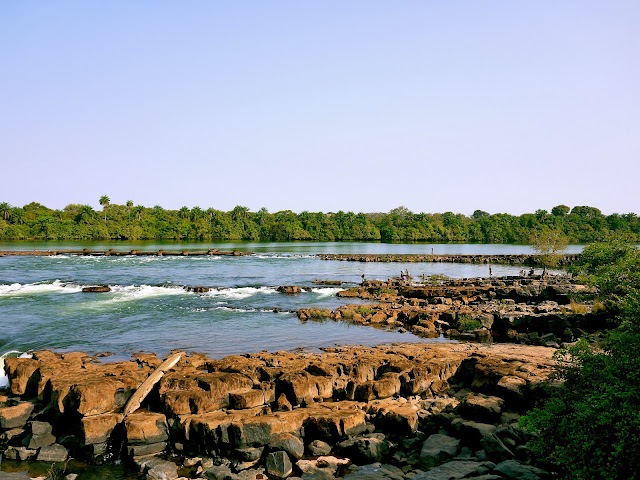
Finding place to bush camp had actually become rather difficult to due to the ubiquitous presence of people. Time after time I would head off down a dirt track off of the main road and run in to the a group of huts or after stopping for a while someone would eventually wander out and find me. Basically any place that you may think would be a great camp site near some shade trees or a water source is sure to have someone living there. After spending the entire day interacting with people and communicating with some difficulty I usually just wanted some solitude, so I would motor on, looking for my place to hide in the jungle.

About 50 km from the border between Guinea-Bissau and Guinea (Conakry), the tarmac ended and the road turned to a rutted out mess that alternated from two track to single track. I don’t see how you would traverse it in a truck, and during the wet season, it looked as though this stretch may be difficult to pass even on a motorbike.

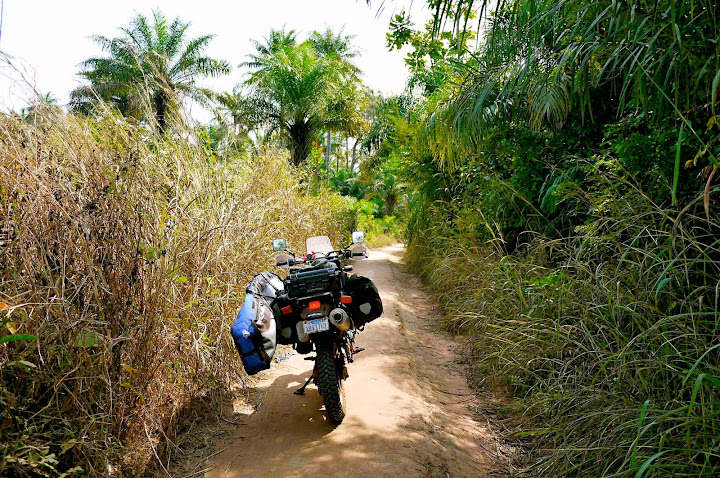

Moto fans mugged for the camera.

This is what the international border crossing between Guinea-Bissau and Guinea looks like:

After crossing the border, the same road conditions persisted. I couldn’t believe what I was riding through, given that I had simple taken what looked to be the most direct route between Bissau and Conakry. Stream crossings of varying depths continued, and finally the road dead-ended at a river that even the mighty Dyna Rae balked at.

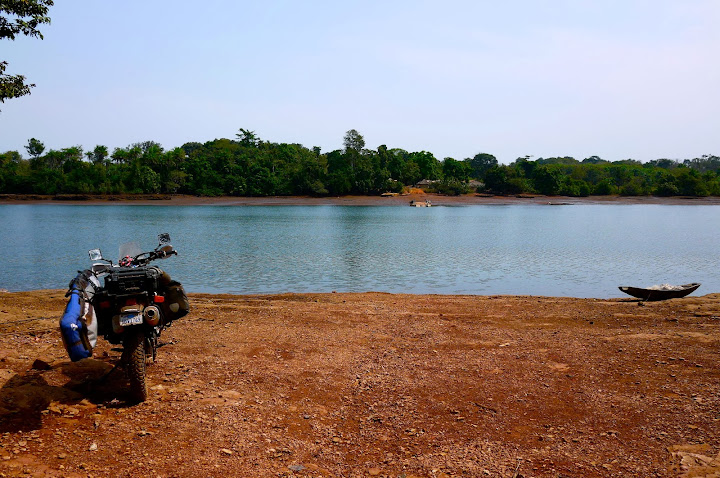
The guys by the side of the river were hand building canoes for crossings and joked that I would need to wait until they were finished before I could cross. After a couple of hours, a guy came across on a cable driven barge to carry me to the other side.

Rather, to carry me almost to the other side.

As the sun sank low, the road became graded, my speed increased, and the grassy plains turned red before me.
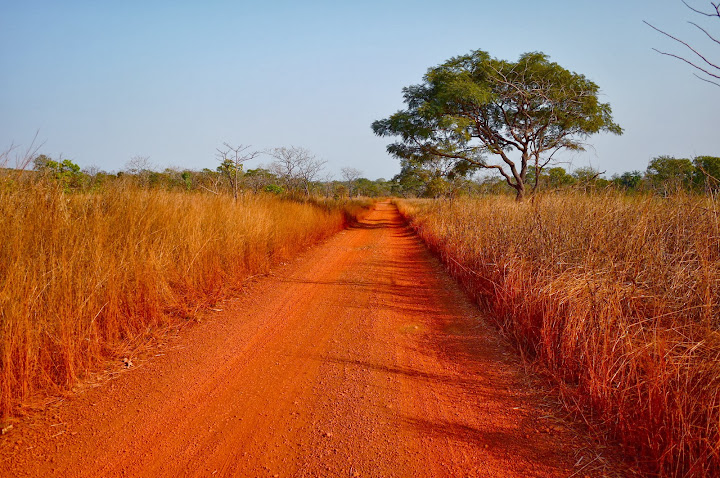
At the town of Boke, the tarmac unexpectedly resumed after more than 150 km of dirt tracks. I had resolved that getting to Conakry was going to take days longer than I anticipated. It seems that nothing is wasted here. The villagers use the tarmac as a surface to dry their harvested grain.

It was smooth riding all the way to Conakry, other than a stop by a shabbily dressed policeman who demanded my passport and proceeded to disappear into the adjacent busy marketplace. Of course he wanted some money for its return, but I had run out of the local currency, Guinea Franks, so he settled for a few Central African Franks that I still had from Senegal. In Conakry, by pure chance I met Tony, the Belgian in the van, on the street near the Sierra Leone Embassy. We hadn't seen each other since Dakhla. Conakry was a hot, sticky, loud, stinky mess and it was nice to find a familiar face. The only place we could find to stay was the parking lot of the Total gas station, which also happened to be next to the local dump/open sewer. The highlight of the day was when a cute gaggle of piglets would waddle in to root around for their lunch.

At night it smelled as thought I had my head inside the gas tank, headlights periodically blazed straight into my tent, the club across the street blared music until 3 AM, and the military guy holding the semi-automatic weapon tasked with protecting the gas station milled about 10 ft. away from my tent joking with his friends. I lay there sweating through my sleep mat. This is the adventure part of the surf adventure. We got on the road an hour before dawn.
The crossing into Sierra Leone proved to be our next trial of endurance. Having come across a rural border crossing I had no entry stamp on my vehicle document, the Carnet de Passage, for Guinea, which was sure to cause some kind of problem and ultimately cost some money. There were a mind boggling 5 customs stops before leaving Guinea, each of which checked the exact same thing. By pure luck, I miraculously managed not to show my Carnet to anyone at any of these stops. After each one I breathed a sigh of relief and couldn’t believe it when another one appeared 200 meters ahead on the road. At the final checkpoint, we found large man in a bad mood, He had an air if self-importance and seemed to enjoy scolding some local folks trying to clear customs. I thought, ‘This is it, I’m sunk’. Again, I just chatted to the police guys about my bike while Tony got his documents stamped and in the end realized that the big man in the bad mood didn’t realize that we had two vehicles. Due to poor coordination between him and the guy who held the gate I was allowed to pass undeterred.
On the Sierra Leone side, the red tape continued, although in more organized fashion than in Guinea. Again and again, we thought that we were home free only to come upon another stop to sweat through in the mid-afternoon heat. The final stop was the kicker. We were being asked to pay 50 Euros for liability insurance that Tony and I had both already purchased. The folks selling the insurance indicated ours was not valid because it was a different color than the one they were selling even though it said the exact same thing on it. The army guys running the checkpoint were in cahoots with the insurance guys and they wouldn’t let us pass without a receipt. After 1.5 hours and much frustration on our part trying in vain to get someone to even respond to any sort of logical statement, we talked them down to a 15 Euro ‘handling fee’.
We had finally made it. We were free to explore the fabled beaches of Sierra Leone! We sped along the tarmac, busting to find an ocean to jump into to wash the dirt and frustration away. Then Tony’s van broke.

A bushing on his shifter had disintegrated and the van would no longer stay in gear. We found a mechanic who jumped on the back of my bike as we sped back 10 km north to find a part that could be used to bodge it together for the time being. A few hours later we were back on the road and almost immediately found an ideal camp spot next to a gorgeous river. Its what we had been dreaming about since Conakry and it seemed that after our series of trials in the preceding two days, the universe had ultimately provided.

I jumped in and had my first proper wash and shave since two weeks time.

|

26 Jan 2014
|
 |
Registered Users
Veteran HUBBer
|
|
Join Date: Nov 2010
Location: Santa Cruz, California
Posts: 316
|
|
|
Back to the Beach
 Upon arrival in
Sierra Leone we found a tiny little island paradise owned by a London expat named Jason who generously allowed me to pitch my tent on the sand for a few days free of charge.  (check it out here: Welcome to Lakka Beach Resort Hotel | Lakka Beach)

Other island lurkers included a couple of British guys with various business dealings in Sierra Leone and like Jason, had a military history here. These were tough characters, all lifelong adventurers and fighters of one kind or another that seem to need the daily uncertainty of a place like Sierra Leone. After his time in the army, Jason did mercenary work around the world. Exploits of the other guys included a Thai boxing championship and some truly hair-raising survival situations during of the years of civil war in Sierra Leone. It struck me that these are the kind of guys characters are patterned after in Hollywood movies set in west Africa.

The local people here truly have very little of the basic necessities to live and it's a sharp contrast to the privilege that those of us from rich countries enjoy. Jason gives some of the young guys in the village the work that he can and supports the village football team. Many of the guys sleep outside during the dry season. Most things are made with what is on hand and nothing seems to go to waste. Tony has carried soccer balls, umbrellas, cooking utensils, tools, and all manner of other things in his van all gotten for free in his home of Belgium that he distributes to the people we meet. Nothing is ever refused.
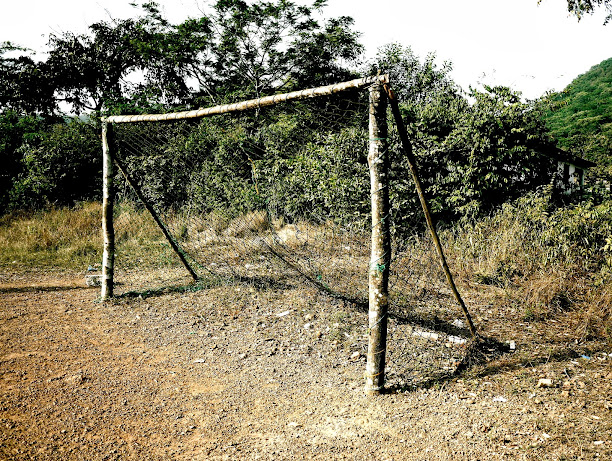
Anytime that Tony and I were making a meal at the van we would have a crowd of boys and young men hanging about who were curious about us and our vehicles, but often also really could use something to eat. When the crowd was small enough we shared what we had. Being a spectacle from morning to night truly becomes exhausting.
This is Tiboi.

He is 14. His father was killed during the war and his mother died shortly after, so he has been mostly on his own for a long time. Unfortunately, his story is not so uncommon in this country that still shows the scars of a bloody civil war. He carries water over to the island and does some cleaning for money. He ate breakfast and dinner with Tony and I and slept on my board bag at night.
It was time for at oil change and valve check for Dyna Rae, so I stripped her naked and got to it. It’s never fun opening up passages to your engine in the dirt, but in central Africa, there is lots of dirt and not much tarmac that isn’t a road.

The access plug on the side of the magneto cover to crank the piston over to the correct position for a valve inspection was very tight and there was plenty of play in the allen socket. Stripping the soft magnesium plug seemed a certainty if I really laid into it. So, with Tony’s help, a solution was reached Africa style, bodging a sleeve from an aluminum can to shore up the play in the allen socket.

While we were still congratulating ourselves for the creative solution, Tony noticed a piece of metal sitting in the bottom of the inside of the engine case. Unfortunately, in pounding the allen wrench in with a hammer, we had pounded through the back of the plug. Brilliant mechanics, eh? I now had a nice hexagonal hole in my engine case -you know, where the oil moves around. You don’t have to know a lot about engines to surmise that this is not a good thing. JB Weld to the rescue! Good as new.
There was no surf at this end of the Freetown peninsula, so I had time to wander around and take some photos.
Faith.

Survival.

Change.

Escape close at hand.
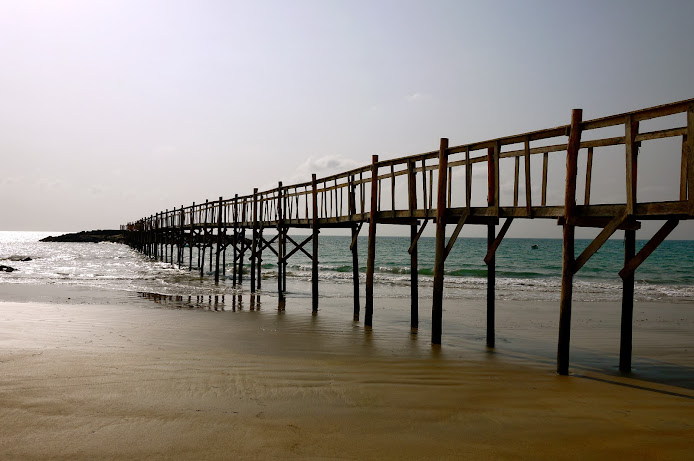
Colonial relics.

Communication.

Held fast.

|

27 Jan 2014
|
 |
R.I.P.
Veteran HUBBer
|
|
Join Date: Aug 2003
Location: california
Posts: 3,821
|
|
|
Excellent!
More prize winning pics   and great descriptions of tough times on the road. Big ups! 
Lots of DR650 riders get stymied by that ****ing engine plug ... PITA. It vibrates tight (as some Alu can tend to do) and then corrosion on top. The popular solution is penetrating oil (or WD40) and HEAT. A careful application of heat can help it break free. Never force.
Mine was very tight first time I removed it. After that, I applied Anti-Sieze grease on the threads and did not put it in very tight.
All good since.
BTW ... if it's stuck ... to check valves simply remove the other small inspection cover (usually not too tight), pull one spark plug out, put bike in 5th gear ... and rotate rear wheel until on the mark. YES .. you have to get the rear wheel up to turn it ... but this works pretty well!
How were your valves? In spec? Mine have needed very little adjustment in
55,000 miles. Lots of time spent at 90 mph too! All good ... fingers crossed!
Good luck, stay healthy! 

|

30 Jan 2014
|
|
Registered Users
New on the HUBB
|
|
Join Date: Sep 2013
Posts: 1
|
|
|
Epic report! Thx for sharing. Great photography too.
Sent by wing, prayer & ATT
|

30 Jan 2014
|
 |
Registered Users
New on the HUBB
|
|
Join Date: Dec 2012
Location: Bonn
Posts: 15
|
|
|
Awesome trip!!
Love your way of writing and your eye for great pictures!
I'll follow this thread. Have safe trip and stay healthy!
|

31 Jan 2014
|
 |
Registered Users
Veteran HUBBer
|
|
Join Date: Nov 2010
Location: Santa Cruz, California
Posts: 316
|
|
|
Freetown Sliders

Some of the most stoked surfers I’ve ever met are here at Bureh beach at the south end of Sierra Leone's Freetown peninsula. They have the bare minimum needed to surf, yet their enthusiasm for sliding on waves is undaunted and they are in the water anytime a ridable wave presents itself.  They share waves, rip turns, switch stance, fall off, and shout for each other. Being in the water with these guys reminds me of learning to surf with my friends when I was 13 years old. There is no fighting for waves and no egos on display, only the stoke of learning something new every time they get in the ocean.

Sierra Leone was ripped apart during bloody civil war that lasted from 1991 to 2002 well known for atrocities committed by rebel armies with large contingents of child soldiers and funded by the country’s productive diamond mines. For many in the developed world, the war in Sierra Leone entered into popular consciousness as the backdrop to the 2006 film ‘Blood Diamond’. The reality of war left a third of the population displaced, 50,000 dead, many more seriously injured or maimed. Operation ‘No Living Thing’ laid waste to Freetown. Doesn’t exactly sound like a place that you’d want to visit, right? However, this bloody episode in recent history stands in sharp contrast to what you find as a visitor to Sierra Leone. While the people and places still bear the scars of the conflict, I couldn’t imagine a friendlier, more welcoming place. Sierra Leone is now peaceful, and the economy is on the rise as people begin to discover what a great place it is to invest and to visit.

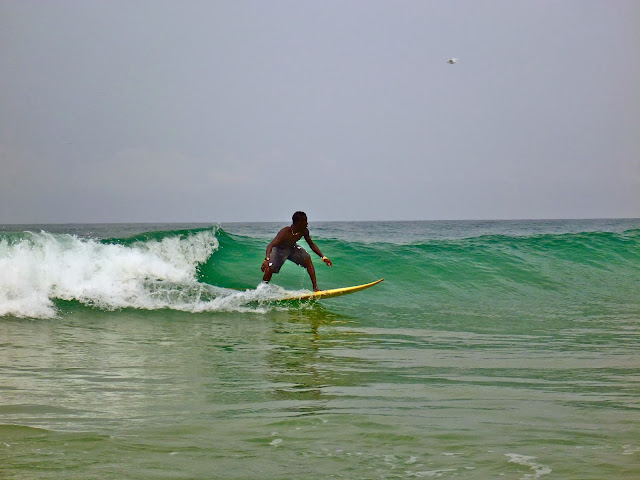
An Irish surfer named Shane O’Connor living in Freetown recently helped the local surfers start the Bureh Beach Surf Club. With his help, they are promoting surfing in Sierra Leone, training new surfers, and run a restaurant and some bungalows on the beach. As a non-profit, community-based organization, a cornerstone of the club’s business model is to use their natural resources in a sustainable way to the betterment of the entire Bureh community.

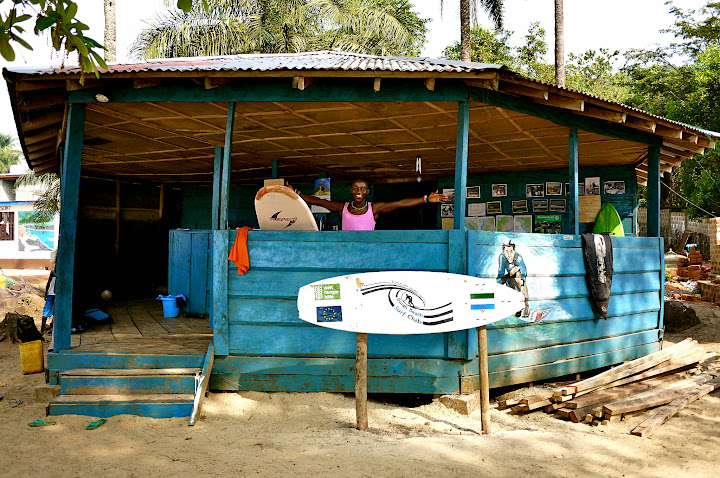
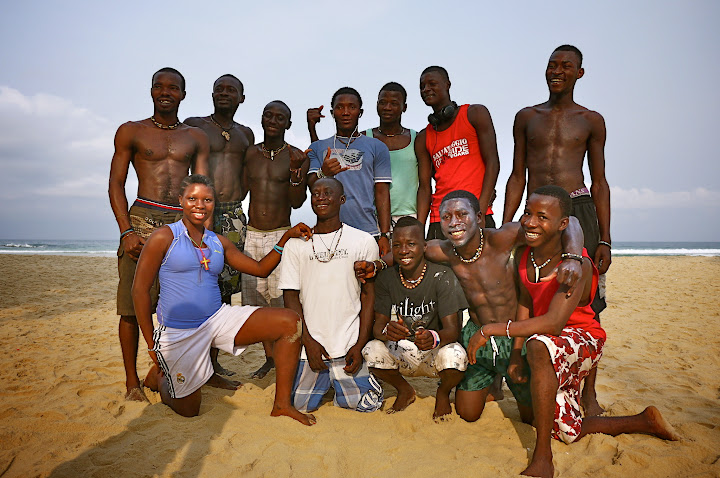
Bureh beach itself is one of the most beautiful places I’ve ever been, with a turquoise meandering river emptying to the ocean near a rocky headland that tiny Bureh village sits upon, flanked by steep jungle covered hills. The river bar creates a pretty consistent left-hand wave and some rights that pop up here and there. The water is the absolute perfect temperature – cool enough to be refreshing, but you never get cold even after hours out in your boardshorts.
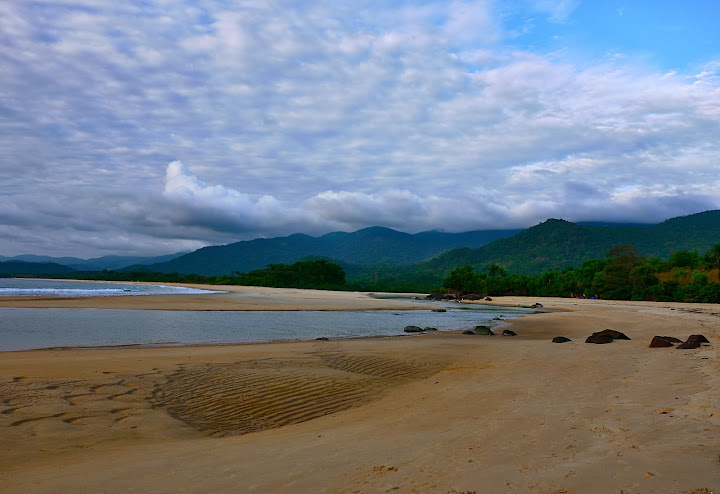
The guys here live like some romantic vision of the surfer lifestyle in California in the 1950’s. They sleep on the beach and cook communal meals together. For two weeks, I’ve made my home on their beach and shared meals with the Bureh beach surfers. They are the most welcoming surfers I’ve ever met. What little they have, they share with me and I feel honored to be their guest. The spirit of surfing is alive and well in this remote corner of West Africa and it humbles me to find it here.
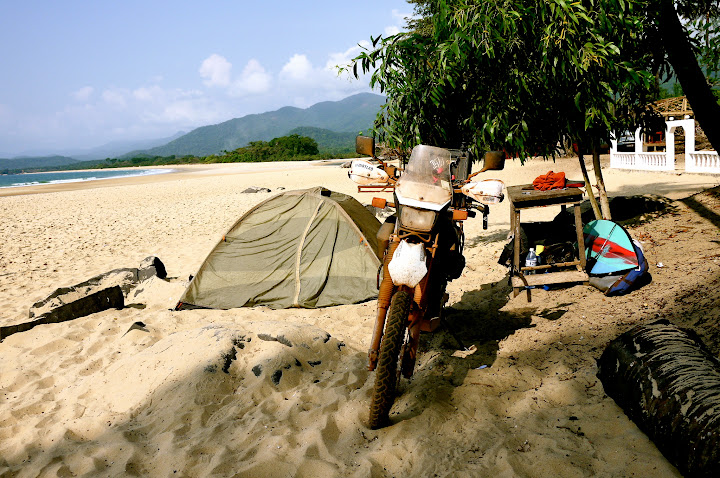
Money earned by the club goes to purchase communal surfing equipment, upgrade the facilities, provides meals for the surfers working there, and into Bureh Village. They make most of what they need with simple hand tools.

Part of what they earn goes to supporting the 30 or so orphan kids in the village, many of whom lost their parents during the civil war. Seven thousand Leones (about $1.60) for each of them provides transport to and from the closest school and lunch 5 days a week. On Wednesdays and Fridays all the kids from the village come down to play and have some surf training. The beach is filled with little ones running about, dancing, singing and surfing. The energy on the beach on these days is truly joyful.
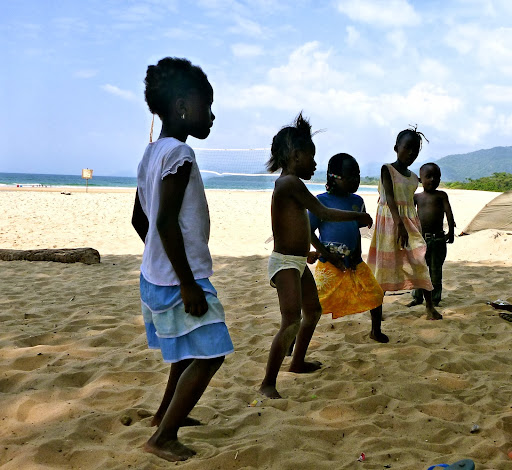

Grommets in flight: 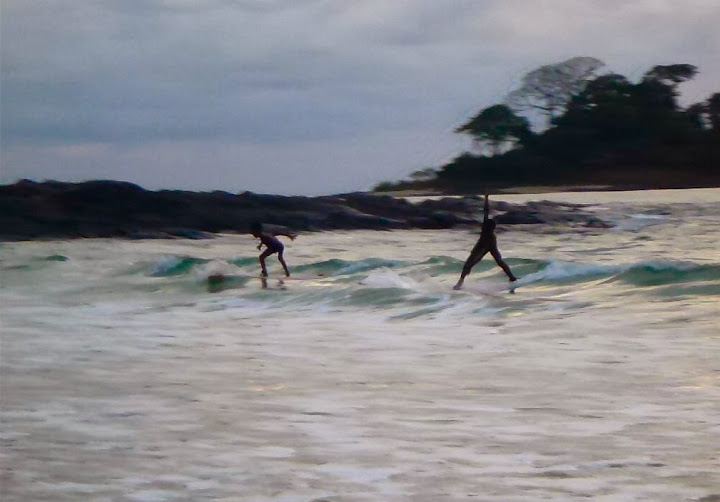
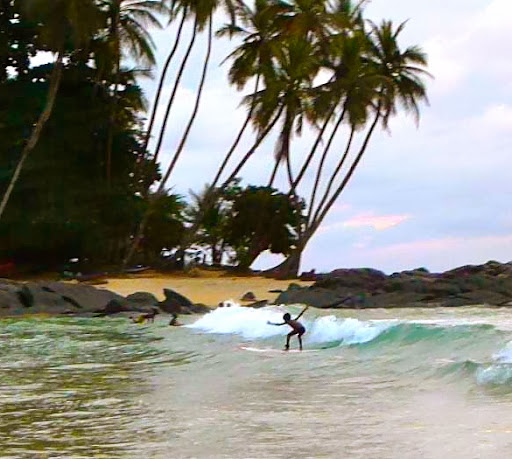
Meet KK, the first female surfer in Sierra Leone:

This simple, slow living comes with some real hardship. The club has no electricity and there is one well with a hand pump for water. Meals are basic, consisting of mostly rice with a sauce of casaba leaf and minced fish. The cooks bring out a massive plate of the dish du jour and a pile of hungry surfers dig in.

There is nowhere to buy surfboards, leashes, or even wax in Sierra Leone and most of their equipment is delivered personally by traveling surfers from the UK and Europe. When everyone wants to surf, they take turns trading off boards. When their boards are damaged, they have no way to repair them. I spent an afternoon in Freetown looking anywhere and everywhere for some fiberglass cloth and polyester resin to no avail. Most people had no idea what I was talking about as all of the small boats here are made from wood rather than fiberglass. I added my board to the communal stock during my stay.
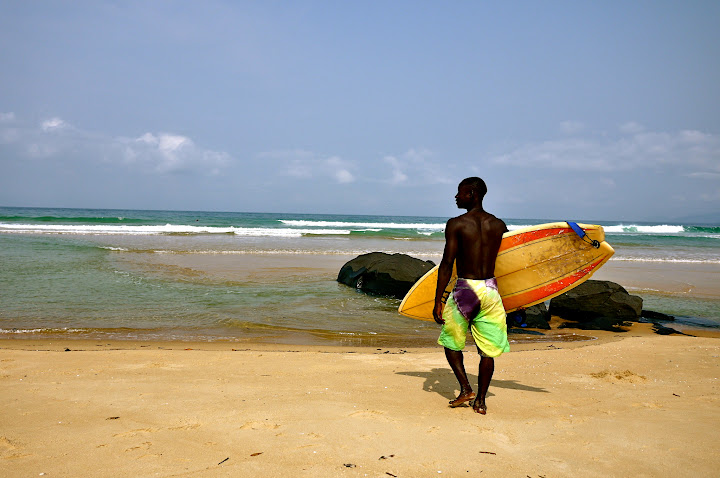
Shortly before I arrived, they made a trip to a left-hand pointbreak. It was the first time any of them had surfed anywhere besides their home beach, which is to say that it was the first time anyone in Sierra Leone had surfed anywhere besides Bureh beach, since they are the only surfers here. Welcome to the surfing frontier of West Africa.
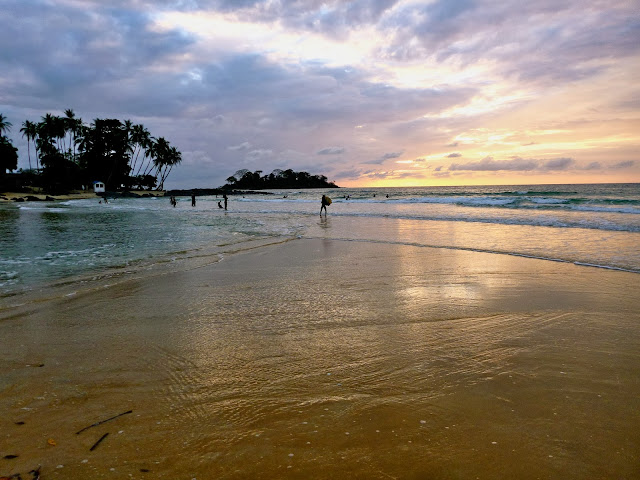
Check out the Bureh Beach Surf Club on their facebook site. Donations to the club go directly to supporting a surfing community with very little means. If you happen to be traveling to Sierra Leone, bring a surfboard or a leash, or even just some surf wax!
Last edited by garnaro; 4 Feb 2014 at 13:46.
|

7 Feb 2014
|
 |
Registered Users
Veteran HUBBer
|
|
Join Date: Nov 2010
Location: Santa Cruz, California
Posts: 316
|
|
|
Schools for Sweet Salone

While surfing at Bureh Beach on the south end of the Freetown Peninsula I met a Spaniard named Coco who is building schools in the remote Wara Wara mountains of Sierra Leone.  He invited Tony and to come for a visit and we spent two days chasing Coco around on jungle tracks getting to know the country and people of the region.


First, we had to get his extra bike running after it had been in hibernation for a few months, so Tony and I set to work checking for fuel, air, and spark. Soon enough, we had the Honda XL125 roaring back to life and ready to roll.

Well, almost ready to roll anyway. We made a quick stop at the local garage to replace the chain ring carrier rubbers and shock bushings that had disintegrated. While there we watched the guys in the most primitive of makeshift garages yank the engine out of another XL125, which are ubiquitous in the area, and have it half disassembled in about 20 minutes. They are fantastic mechanics who can bodge together about anything that you might need from what they have on hand. The parts we needed were made on the spot from scrap rubber.

The mechanics kids ran around the place and played with their toys. By toys, I mean greasy engine parts. They can probably already rebuild a carburetor.

Midway through the morning Tony’s rear tire punctured. After patching the tube, the tire was incredibly difficult to get back onto the rim. Tires for small dirt bikes like this are usually fairly easy compared to the bigger bikes like my DR650. After much grunting, sweating, and knuckle bashing, we managed it, only to find that we’d pinched the tube with the irons in our struggle to coax the tire back onto the rim. We’d fairly mangled the tube so that it wasn’t patchable. Now we had a problem.


Coco and I set off to the next village 7 miles ahead in the blind hope of finding a tube and left Tony to contend with the heat and incessant flies. The flies were so bad that he lit a fire by the roadside, so that the smoke would keep them at bay.
As small as it was, the next village was actually the capital of the Wara Wara region, called Bafodia. Luck was with us: the single tube available in Bafodia would fit the tire. Everyone in town knew Coco from his work in the area, but they were curious about the other visitor on the big bike. There are generally no bikes bigger 150cc here, and so the DR650 always gets plenty of attention and praise from the locals. ‘This moto is strong” they proclaim. Inevitably followed by the offer, “We trade, ya?”


We returned to rescue Tony from the flies, put his bike back together and we were off again, riding deeper and deeper into the mountains. We bounced along two tracks winding through the jungle, small stream crossings, and steep rocky hill climbs. It’s no wonder Coco rides a motorbike everywhere, as crossing this terrain in a 4x4 truck would be terribly arduous. On a motorbike it's tiring, but really lots of fun. In fact, Coco’s ride to work is what most dirt riders in the US or Europe would seek to ride on weekends or longer off-road trips.



This is the old school building.

This is the new one.


I met loads of cute kids and make them giggle showing them photos of themselves.



Coco really knows how to work the people of the villages there. It would be impossible to do this work without a good understanding the culture here and a willingness to adjust plans accordingly. Everyone knows the man on the little dirt bike and shout 'Mr. Coco!' as we ride past and they project incredible warmth towards a visitor like me. Places like this are the heart of ‘Sweet Salone' as the locals affectionately refer to their country.

In a nearby village, building of the school was still in progress. Bricks were being formed, timber cut, and walls were coming up.


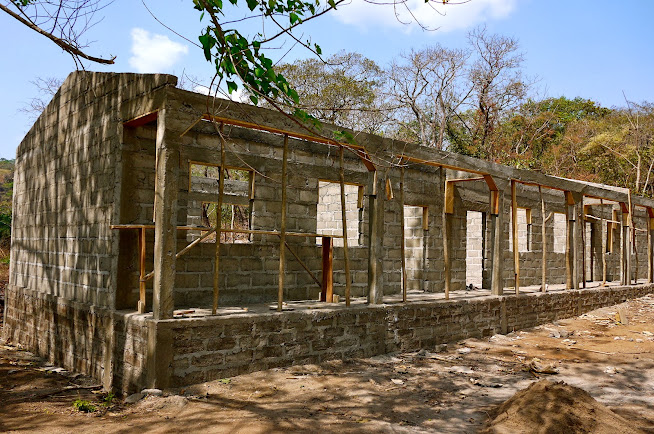

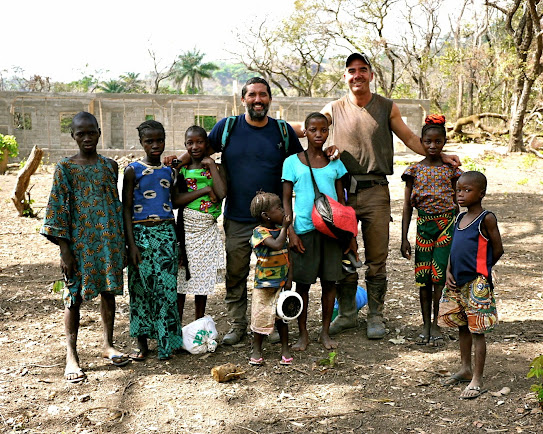
It takes a special type of person to do this job. Coco's work reminded me the story portrayed in the bestselling book Three Cups of Tea about an American who runs around building schools in rural Pakistan by sheer force of his own with no resources or experience to begin with. I watched Coco talk with the village councils, keep workers on task, and try to track down some bags of cement that had gone missing. He bargains for the price of materials like a local and holds everyone to account for what they are meant to deliver and keeps a positive tone throughout struggles. He acts like every dollar wasted is a dollar that the village kids miss out on. Because it is.

The people here live a simple but difficult existence and are vulnerable to disease and hunger. Some villages don’t have access to clean water. Back in California, I spent most of my working hours helping find solutions to water pollution problems. As important as those problems are, being able to work on them seems like pure luxury in comparison to the very basic need of having clean water to drink which many of these people simply don’t have.

We raced down from the mountains, eager to return to the town of Kabala for some dinner, but our bike problems weren’t finished yet for the day. Coco’s front sprocket retainer had failed, the sprocket came off and let his chain jump off of the chain ring. While we probably could have towed Coco’s bike back the 7 miles to Kabala there were a number of steep rocky sections that may have been tricky. Instead, we pushed his bike to the nearest village and met with the chief, who agreed to let us leave Coco’s bike at his place for the night.


Coco and I rode 2 up on my bike back to Kabala and returned the next morning with a new front sprocket. We repaired Coco’s bike and shot into the mountains for another round for the day. The days in these Wara Wara have been some of the most memorable of the entire trip so far.
|

21 Feb 2014
|
 |
Registered Users
Veteran HUBBer
|
|
Join Date: Nov 2010
Location: Santa Cruz, California
Posts: 316
|
|
|
Some Kids in Sierra Leone Need Your Help

In a remote mountain village called Kakonso, I got a bit caught up in the moment and promised some really cute kids that I would have a well built for the school in their village, where they currently have no access to clean water.

Since I’m presently an unemployed surfer living in a tent, I’m not exactly in a position to be funding village infrastructure projects. So, I’ve shot my mouth off to feel like a hero and now I want you, the person reading this post to help bail me out. Sound fair?
See what I mean about the cuteness?

This is Coco. He's the Hero.
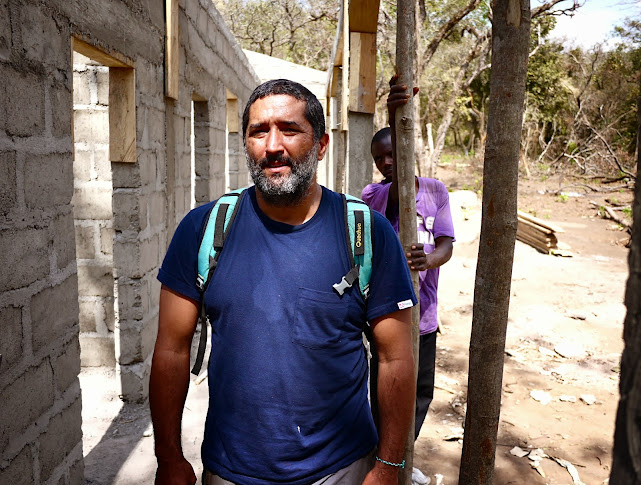
I met him surfing at Bureh Beach near Freetown, where told me about the schools he was building in the severely impoverished Wara Wara mountains and he convinced me to come for a visit. He operates the Wara Wara Community Schools Project on a shoestring, barely pulling a salary to bring the most bang for donors bucks to the people of this region.
There are all kinds of good ways to spend your hard earned cash, so I’ll give you a few reasons that you should use a bit of it here.
In 2013, the UN Human Development Index (HDI) ranked Sierra Leone 177 of 187 nations assessed. Sixty-three percent of the population lives on less than $1.25 a day. The province of Wara Wara Bafodea is one of the country’s poorest – it makes the Freetown peninsula beach villages with their burgeoning tourist industry look well-off by comparison. Wara Wara province has about 30,000 inhabitants spread over some 150 villages, many of which are very difficult to access due to the steep mountainous terrain. Coco rides a 125cc dirt bike everywhere. There are no hospitals. Two nurses and one paramedic serve the entire area. Less than half of the the rural population of Sierra Leone has access to clean water and more than 20,000 children under the age of 5 die every year from a water related illnesses across the country.
The primary school enrollment rate is one of the lowest in Sierra Leone as the government fails to address existing schooling needs. This is what the Kakonso school was like before Coco arrived.

Now it looks like this.

People here live in a beautiful natural setting in very basic mud brick houses with thatched or corrugated tin roofs.

This is the water source for the school and in fact the entire village.

These are some of the kids who live here.


Their warmth completely disarmed me. If you were standing in the same spot as me, you might also have found it hard to simply walk away. It's likely that without a clean water source, some of the kids that live in Kakonso village will die of a water borne disease. But that doesn't have to happen. Let's help these people.
This is the spot in Kakonso village where we want to drill the well, just below the new school.

Once drilled, it will be sealed with a concrete cap and a high quality hand pump installed to and bring water from about 100 feet or so below the surface. It will provide clean water to the more than 400 people in and around Kakonso village.

It will cost $4500 dollars to build and maintain this well. I told Coco that I would have the funds for the well by the time I reach Cape Town in June, 2014, so time is short.
If you like reading this blog as much as I like writing it, you can ensure that it continues by not making me pay for this well myself! In return, I’ll provide images and updates from the people of the Kakonso village so that you can see first-hand the good that your hard earned cash has done.
Sold yet? Come on…. give 20 bucks. I’m just going to keep interrupting the moto and surfing stuff until you do, like a funding drive on NPR. I might even call you at home like Ira Glass does.
A few clicks can change these people's lives. Please go to bugsonmyboard.org to make donation via Paypal and be part of the team to help get this done. And leave a comment if you like, so we can all know who is making this happen.
I'll keep this post at the top of the blog and update regularly with our progress.
|

23 Feb 2014
|
 |
Registered Users
Veteran HUBBer
|
|
Join Date: Nov 2010
Location: Santa Cruz, California
Posts: 316
|
|
So far so good!

thanks to all for the generous donations 
|

2 Mar 2014
|
 |
Registered Users
Veteran HUBBer
|
|
Join Date: Nov 2010
Location: Santa Cruz, California
Posts: 316
|
|
|
Going Left in Liberia

After more than a month, I finally managed to extricate myself from the Freetown peninsula. The welcoming nature of the surfers, my beautiful camp spot on Bureh beach, the buzz of new beginnings in Freetown, and the ever-present hopeful spirit of the people made it a good place to get stuck. Sometimes a long journey just feels looking for one place after another to get stuck. Places that fill in the gaps for a while that widen with every mile on the road. 


While in Freetown, I'd procured a fresh new passport from the US Embassy and employed the usual African ingenuity to repair the broken latch on my toolbox.
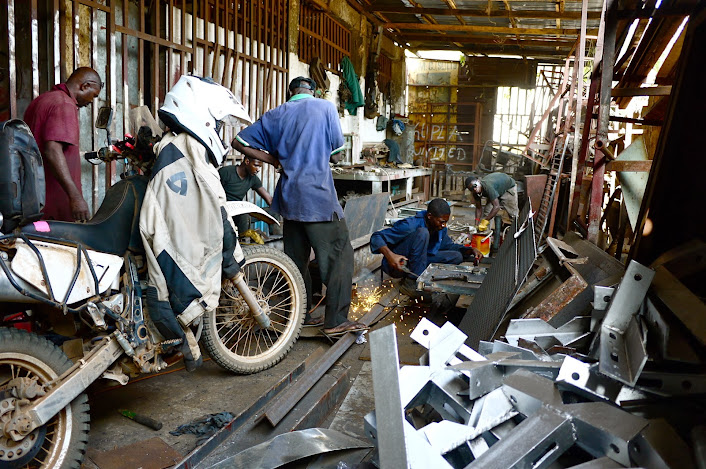
I even managed a to leave with stack of calling cards courtesy of Tony on the Road’s mobile media center.

When it was time to head off, some of the kids from Bureh wanted to come along for the ride.

I managed to shake them.

Motoring south through Sierra Leone the road deteriorated to the point that I weaved in S-tracks back and forth across the road to avoid all of the truck sized holes. The smaller holes had nice smoothly curved sides that I could into ride into using them as berms to bank off of. Massive woops created by the trucks swallowed up every inch of Dyna Rae’s travel and sent me weightless over their crests. I thought that I may have taken a smaller road by accident, but I knew that those holes must be from the biggest of trucks. If they were on this road, I figured that it must be the main road south.

The road eventually turned into a river.
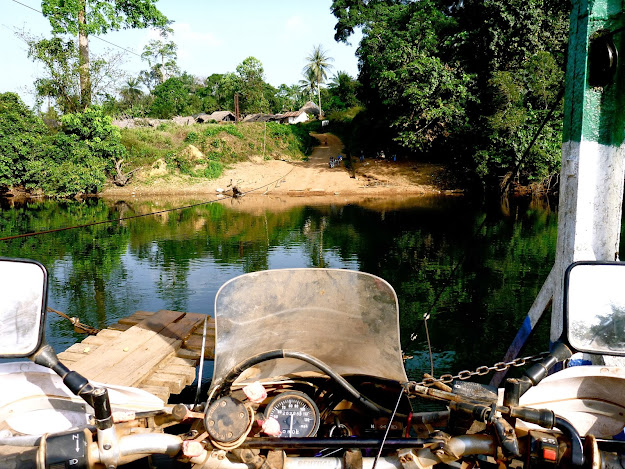
Roads like this are utterly arduous to travel in a truck as you get shaken to bits with every hole and protruding rock. While tiring to ride on a motorbike, it’s fun also plenty of fun endeavoring to keep pace with a smooth flow through the whole mess. I made my stealth bush camp for the night out of sight from the road and as usual ended up hearing voices for hours along the road and hoping to stay undetected. Sometimes I feel a bit old to still be honing my hiding skills.
The jungle bloomed around me.

The trees towered overhead.

The forest corridor stretched on.
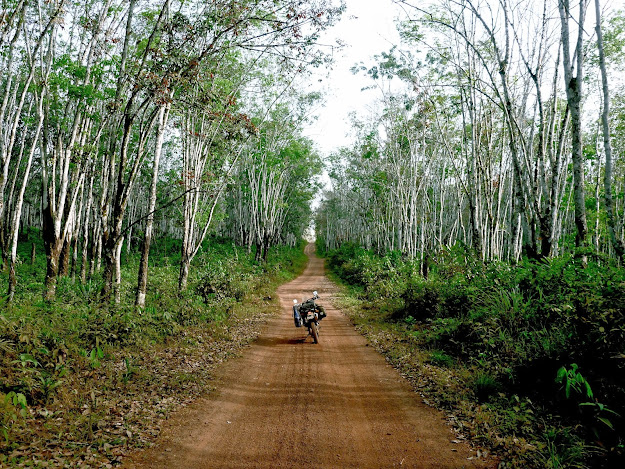
I couldn’t have timed my arrival to the beach in Liberia any better, with a fresh swell just rolling in to the legendary left-hand points of Robertsport that I was so keen to ride. The continental shelf drops off abruptly offshore of Liberia, allowing open ocean swells approach the coast at full steam. Swells slam into a series of points to generate the storied reeling, down-the-line waves that are still rarely ridden by more than a handful of surfers.

Like Sierra Leone, Liberia endured years bitter civil war that left the cities in ruins. The second Liberian civil war lasted from 1999 to 2003, close on the heels of the first civil war lasting from 1989 to 1996. Together the wars resulted in 250,000 people killed. The first war ended with Charles Taylor in control who went on to play a role in further atrocities committed in neighboring countries. In September of 2013, Taylor was found guilty of war crimes in a tribunal at The Hague for his role in Sierra Leone's civil war and sentenced to 50 years in prison. A tenuous peace has in endured for the last 10 years in Liberia with democratic elections dictating changes in power rather than coups by warlords.
While peace has come to Liberia, the tourists have not. In fact, the only white people that I meet here are those working in some capacity or another, either for the US State department, US AID, Peace Corps, or one of the NGOs. Your only company non the beach are fishermen going about their daily business.

Robertsport is filled with interesting looking buildings with plenty of dilapidated character.



I rode the points of Robertsport at about head high for days with hardly anyone to share it with. I did enough backhand snaps to get on my own case when I did a bad one and congratulate myself a bit when I did a good one. It’s a funny thing surfing good waves by yourself all day: its a fantasy when you’re surfing your normal crowded breaks in California, but after you do it for a few days straight, you just want someone to share in the fun (and see when you do a good backhand snap). I wasn’t even surfing the best points most of the time, which really get cranking during the wet season.
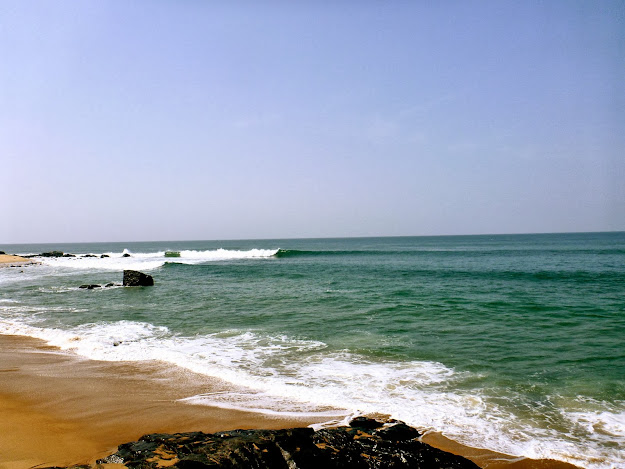
I camped beneath a massive cotton tree that reminded me of ‘Home Tree’ in the movie ‘Avatar’. The trunk was huge and had roots that created vertical walls radiating out away from the tree. It felt like I was getting a big hug from that tree.


When traveling in Africa you have to get used to lots of attention. The kids that you spent the previous afternoon playing with appear at 7 AM to watch you make breakfast and pack your things. The morning that I left was no exception, and I tried to keep my patience with them but failed and ended up telling them that they had to go away.

At the campsite I met a British girl named Louise who is working for an NGO called the Sustainable Development Institute in Monrovia, which advocates for legislation and policies to improve the lot of local village people in land transactions. This sort of work is critically important in such a corrupt country as Liberia, where whoever has the cash generally gets to make the rules up as they go. This usually results in the village people, who often use land communally, getting royally screwed when a big company arrives with plans for a forest tract.

Louise invited me to come stay in Monrovia where I slept on the hammock on the balcony for a few nights and had a great time with her and the crew who lived at the house. Most importantly, I learned that I absolutely love sleeping in a hammock in tropical climates. Beats the crap out of sleeping a little tent sauna.
The UN is still here in force as are copious NGOs still helping to put the pieces back together. Nowhere is the UN presence more apparent than in Monrovia – the place is filled to the brim with UN workers and still some troops. The white trucks with the big UN marked in black letters on the side are ubiquitous throughout the city. American accents can be heard all over the place. It’s kinda weird. I scurried off from Monrovia for more hiding in the bushes.

|
|
Currently Active Users Viewing This Thread: 6 (0 Registered Users and/or Members and 6 guests)
|
|
|
 Posting Rules
Posting Rules
|
You may not post new threads
You may not post replies
You may not post attachments
You may not edit your posts
HTML code is Off
|
|
|
|

Check the RAW segments; Grant, your HU host is on every month!
Episodes below to listen to while you, err, pretend to do something or other...

2020 Edition of Chris Scott's Adventure Motorcycling Handbook.
"Ultimate global guide for red-blooded bikers planning overseas exploration. Covers choice & preparation of best bike, shipping overseas, baggage design, riding techniques, travel health, visas, documentation, safety and useful addresses." Recommended. (Grant)

Led by special operations veterans, Stanford Medicine affiliated physicians, paramedics and other travel experts, Ripcord is perfect for adventure seekers, climbers, skiers, sports enthusiasts, hunters, international travelers, humanitarian efforts, expeditions and more.
Ripcord Rescue Travel Insurance™ combines into a single integrated program the best evacuation and rescue with the premier travel insurance coverages designed for adventurers and travel is covered on motorcycles of all sizes.
(ONLY US RESIDENTS and currently has a limit of 60 days.)
Ripcord Evacuation Insurance is available for ALL nationalities.
What others say about HU...
"This site is the BIBLE for international bike travelers." Greg, Australia
"Thank you! The web site, The travels, The insight, The inspiration, Everything, just thanks." Colin, UK
"My friend and I are planning a trip from Singapore to England... We found (the HU) site invaluable as an aid to planning and have based a lot of our purchases (bikes, riding gear, etc.) on what we have learned from this site." Phil, Australia
"I for one always had an adventurous spirit, but you and Susan lit the fire for my trip and I'll be forever grateful for what you two do to inspire others to just do it." Brent, USA
"Your website is a mecca of valuable information and the (video) series is informative, entertaining, and inspiring!" Jennifer, Canada
"Your worldwide organisation and events are the Go To places to for all serious touring and aspiring touring bikers." Trevor, South Africa
"This is the answer to all my questions." Haydn, Australia
"Keep going the excellent work you are doing for Horizons Unlimited - I love it!" Thomas, Germany
Lots more comments here!

Every book a diary
Every chapter a day
Every day a journey
Refreshingly honest and compelling tales: the hights and lows of a life on the road. Solo, unsupported, budget journeys of discovery.
Authentic, engaging and evocative travel memoirs, overland, around the world and through life.
All 8 books available from the author or as eBooks and audio books
Back Road Map Books and Backroad GPS Maps for all of Canada - a must have!
New to Horizons Unlimited?
New to motorcycle travelling? New to the HU site? Confused? Too many options? It's really very simple - just 4 easy steps!
Horizons Unlimited was founded in 1997 by Grant and Susan Johnson following their journey around the world on a BMW R80G/S.
 Read more about Grant & Susan's story
Read more about Grant & Susan's story
Membership - help keep us going!
Horizons Unlimited is not a big multi-national company, just two people who love motorcycle travel and have grown what started as a hobby in 1997 into a full time job (usually 8-10 hours per day and 7 days a week) and a labour of love. To keep it going and a roof over our heads, we run events all over the world with the help of volunteers; we sell inspirational and informative DVDs; we have a few selected advertisers; and we make a small amount from memberships.
You don't have to be a Member to come to an HU meeting, access the website, or ask questions on the HUBB. What you get for your membership contribution is our sincere gratitude, good karma and knowing that you're helping to keep the motorcycle travel dream alive. Contributing Members and Gold Members do get additional features on the HUBB. Here's a list of all the Member benefits on the HUBB.
|
|
|















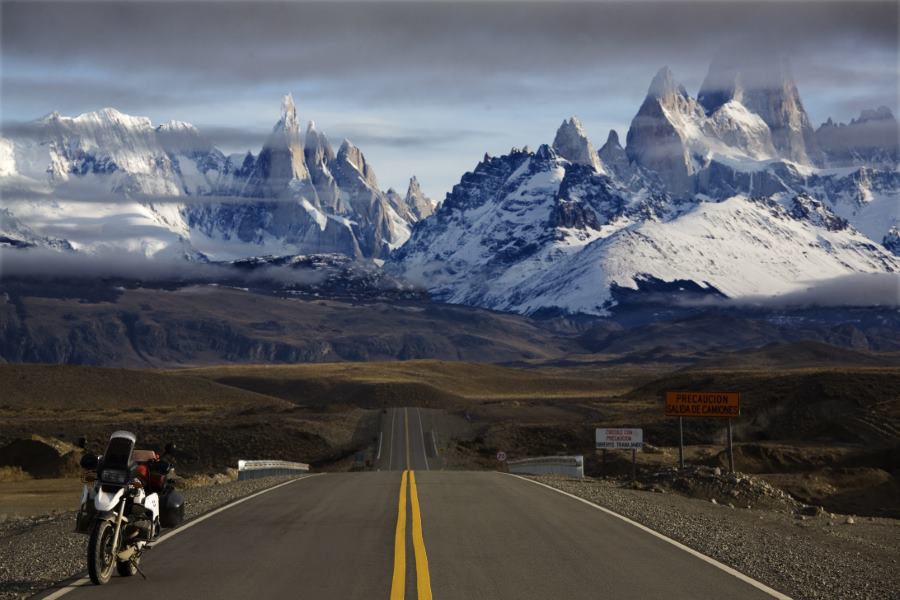
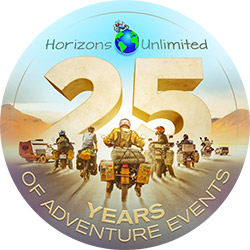
 134Likes
134Likes
 There was no one I could convince back home to do this trip, so it is true that I set off alone. While the vision of a solitary man roaming the coastlines of the world with only his trusty surfboard at his side is a romantic one, I’ve never found it to have much basis in reality. Of course there are lonely stretches from time to time, but generally, I don’t seem to spend all that much time alone. Whether it’s meeting other travelers or getting to know the people of the places I visit, company is usually never far away. My recent stay in Western Sahara is a great example of friends that seem to always materialize on the road, where a gang of us spent weeks living at a campground.
There was no one I could convince back home to do this trip, so it is true that I set off alone. While the vision of a solitary man roaming the coastlines of the world with only his trusty surfboard at his side is a romantic one, I’ve never found it to have much basis in reality. Of course there are lonely stretches from time to time, but generally, I don’t seem to spend all that much time alone. Whether it’s meeting other travelers or getting to know the people of the places I visit, company is usually never far away. My recent stay in Western Sahara is a great example of friends that seem to always materialize on the road, where a gang of us spent weeks living at a campground.








 ... now at 55,000 miles. Most of that old thread shows all the mistakes I made. I've learned lots since and figured out a few things for "on the road". I should go back the correct all the mis-information and incorrect assumptions. Someday.
... now at 55,000 miles. Most of that old thread shows all the mistakes I made. I've learned lots since and figured out a few things for "on the road". I should go back the correct all the mis-information and incorrect assumptions. Someday. 



 s. The fisherman who watches my bike while I surf brings me a fish to eat hot off the grill as soon as I’m out of the water. The girls at the coffee shop laugh at my pronunciation of French words that they try to teach me. I know where to turn off to avoid traffic jams and when I can ride up on the sidewalk to pass cars without encountering a massive drop-off or hole. I’ve developed jedi-like powers for anticipating particularly dangerous moves from a taxi driver. Every day I ride less than 2 miles and every day I see at least two traffic accidents. Today I saw three. If I happen to forget my sunglasses I constantly have little bits of diesel debris flying into my eyes. The little tree-lined corner of a parking lot where my tent sits feels like my little sanctuary from the chaos of the city, even if the tent floor was copiously littered with the corpses of giant ants that I do battle with nightly. I’ve ridden lots waves and I have the visas I need, so its time to wedge myself out of this comfortable corner of the city. I got the bike ready and did some surgery on turn signals that had fallen victim to the Sahara dust.
s. The fisherman who watches my bike while I surf brings me a fish to eat hot off the grill as soon as I’m out of the water. The girls at the coffee shop laugh at my pronunciation of French words that they try to teach me. I know where to turn off to avoid traffic jams and when I can ride up on the sidewalk to pass cars without encountering a massive drop-off or hole. I’ve developed jedi-like powers for anticipating particularly dangerous moves from a taxi driver. Every day I ride less than 2 miles and every day I see at least two traffic accidents. Today I saw three. If I happen to forget my sunglasses I constantly have little bits of diesel debris flying into my eyes. The little tree-lined corner of a parking lot where my tent sits feels like my little sanctuary from the chaos of the city, even if the tent floor was copiously littered with the corpses of giant ants that I do battle with nightly. I’ve ridden lots waves and I have the visas I need, so its time to wedge myself out of this comfortable corner of the city. I got the bike ready and did some surgery on turn signals that had fallen victim to the Sahara dust.



 Linear Mode
Linear Mode




